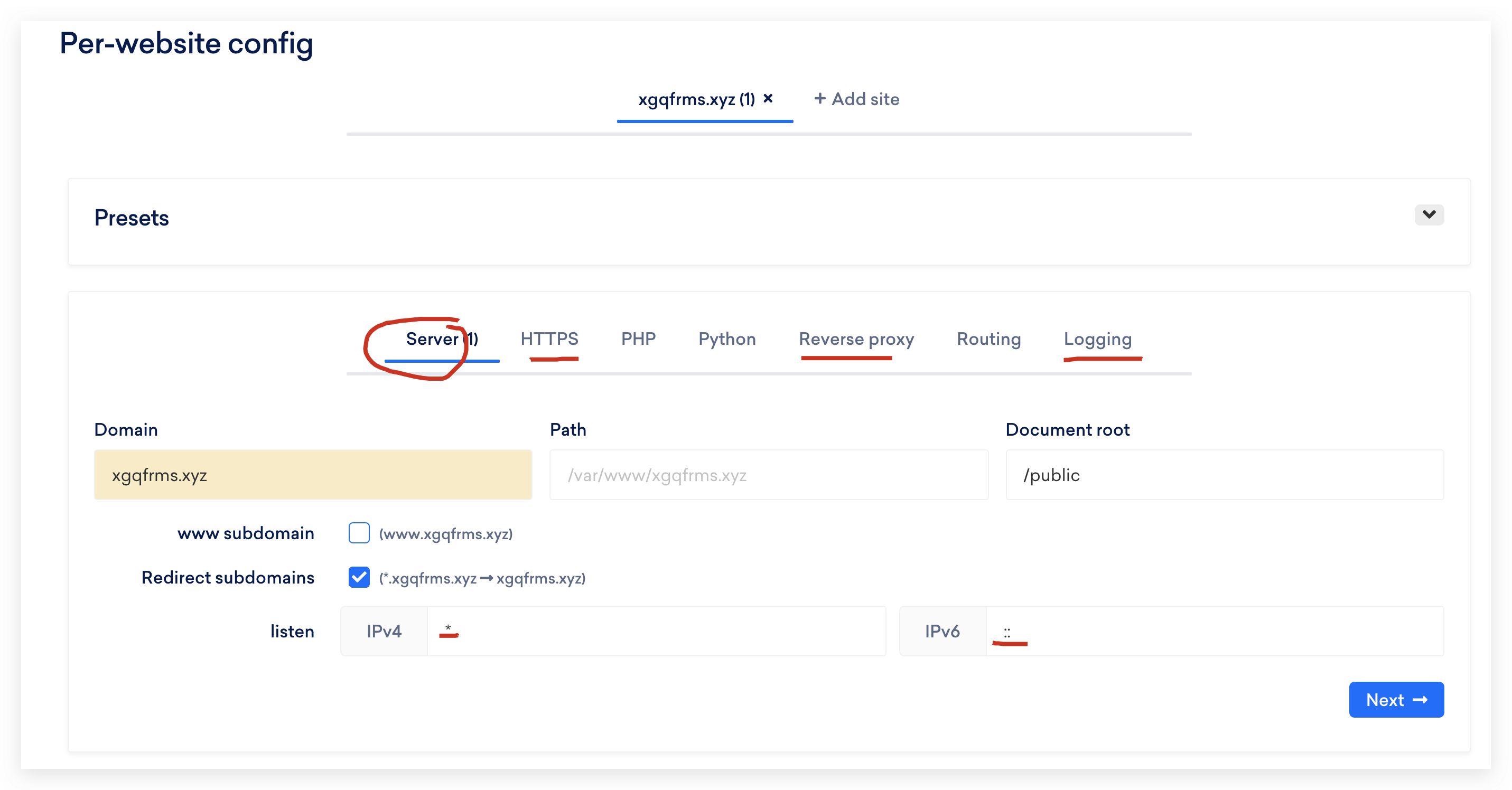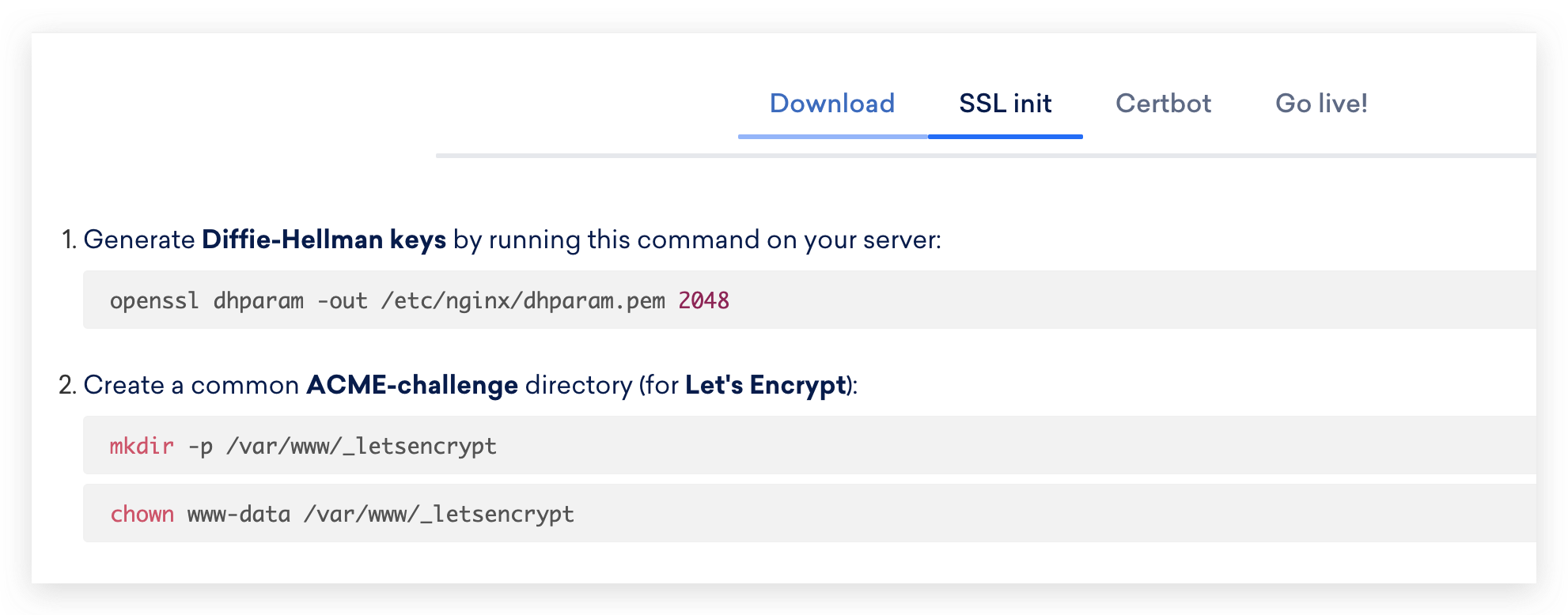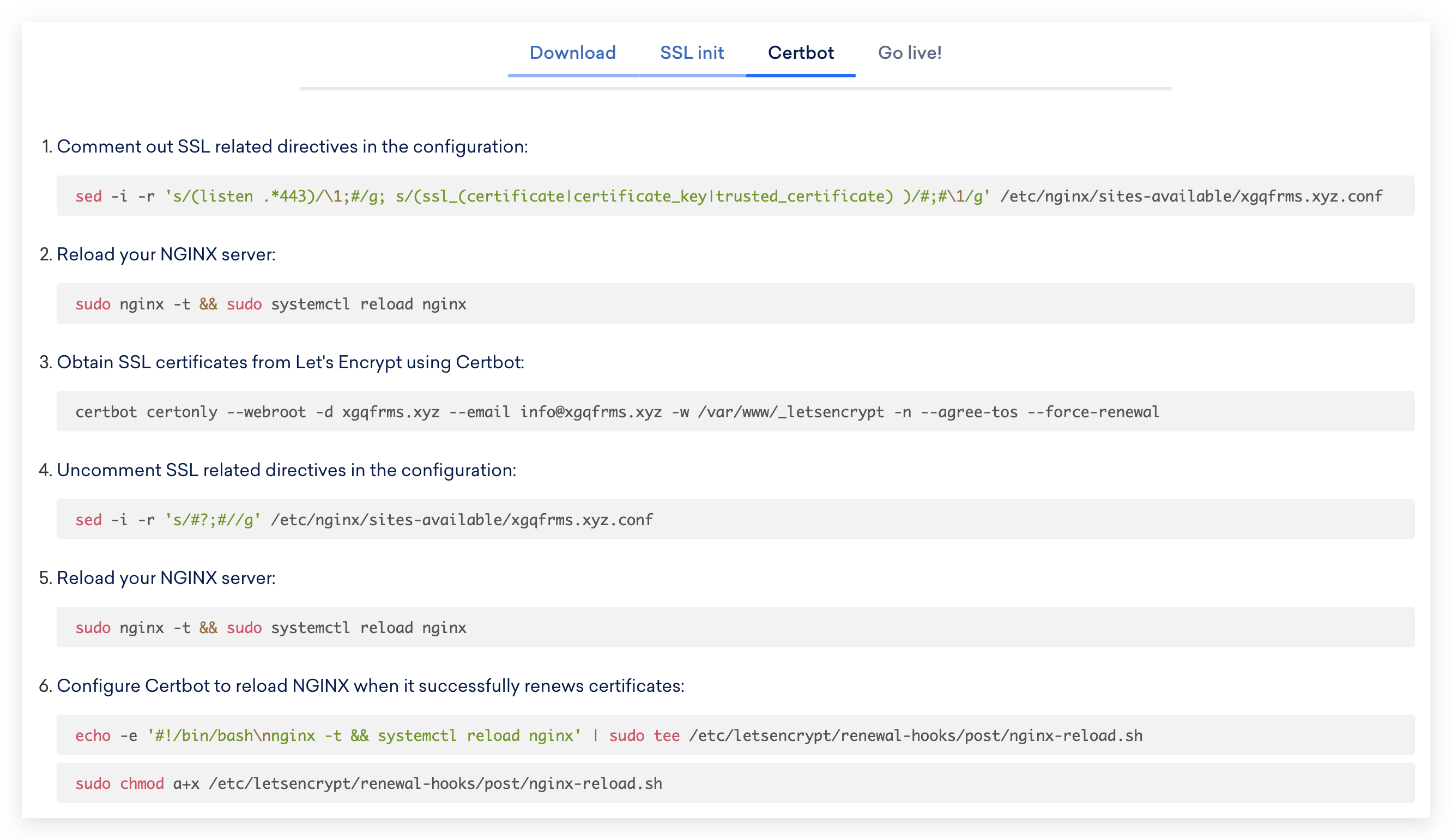NGINX configure auto generator
NGINX configure auto generator
The easiest way to configure a performant, secure, and stable NGINX server.
https://www.digitalocean.com/community/tools/nginx
demo

# Download the generated config: nginxconfig.io-xgqfrms.xyz.tar.gz
# and upload it to your server's/etc/nginx directory.
# or, Copy a base64 string of the compressed config, paste it in your server's command line and execute it.
$ echo 'H4sIAHNbUF8CA+0aaXPbuNWf9StQb6bZpMtbhyuNx+OxvbFn7NgTeTvb2bgciAQprEGAC4A6UmV/ex8PSaSOJO007hHD5qF3AQ94eHjAI48pn5mB4NHBVys2lF6vVzyhbD69Trt34Hg9t213Op2ud1CS28g+eIKSKY0lQgffaPkOvSGcSKxJiEZzxHNzyK2BxiYVre/QWOtU9S1rOp2aIY2pxkwEBHMwmcSCK8k41XNLC8GUVXCfhCLBlCvTNhWREyLNEnA8i3+LZKLM2fzDH2MmRpiZhXRTBCo9YyILI4YluZ+n5Hgk9Hib6I0QMfsUwW1K+DlXK4pWK4M2oM0Cyhgh1njQSmm4hUWWzHipiwn4QWsq5CORfipBc6WIKohwpsUKJRlNqPa5iCgjqNvpeJ1Bq0UmhGuF/t7K6ZOMaerjICCpruoRfFCgKiHQ7ZwEmgquliI+tlq5cpWIYIylIrrZ2ExHxlEpRxEeFg2ol2UlOkihfWmmxnuRIWF4vo0sR9HX4pFwtUJGUYllIgZW7Uci4+EWVsNIKH+M1dhP8MxX9AO0zrXbVYsDRqGLCtRIhPMS73RvoPNy9Hfo5urmonilPGBZ2FQNJTQhZlFFKS4kEYZu9nPQiginKaMBzvvVEoEm2lBaEpys6rgWMYx1XPzKx0cpH5Sq28MESwtApU1YJY0JgLJWIqWQGyybPAVNzoKmWPJV1cPhddnFivlgWAra6GtQSmQwyk442EIGOBgXqimwBRL2QUDfsZPBDinBIwHjK4eiqu6cRhElxiVhLMEcpVjihGiYIJGQ6PzyAgU0HROpMqqJWokMxwVhTTeig0qvCmemZN2fN+IDZQyjKw6iExJScC6o9CmZLMZhJRqmlBYBuI6l6Pvr4cQx3erprfWqWrZuxMUZNNiA+/DUOL0YOu6R8ebsxhhenrqdbr/EvvsEbsUJoCXWO2o3OXfiSs6zy1P4d23j7vb6r45nd2qc27j9rdlb26o/b8+Gd2ioMZhxZaXFQFeA7elaQ/owcWk0XyMlUYJNNlyiYxZ/8LThz0G/uF2722/3bLu89R0oDzvAtg3gI7P4K55tsw1kAO63j7p2eesfQXnYBW63H8AXHJndnum6bn6tf9r5lVfp2lD9n/tepw/XQw3S8fpwPaAJZjQ87tqqqeF6HkFxVW2247CyRrXfs9RMPKc1Q+t1ESQNvohF5fPHIByPGAFO8OP/tet/2VQ8wZTlrbVqi/S/LSr8XPxnt72N+M9pu67zHP89xfgXi3sVYDCqNOHbAVG77eVupQgG3cEnSX/p9x/6O+irIILDgtOgr9nbklCjXeXFCCtSLqsQvllbfFIIvZfPSrMRBAE7192ASE2jPEIgzbnMYP0kPJDzVFuMThpzw4oyxiAeo7xc+nYI8x/J/AuFpZJOgLopSkswTRI22vd5UbU2VboqEmQSYvT9ngtKM+63ljyVz6skUR4SCInHaSUKfu3o8BXVNh+KMGMjHDxWkWMZlSGrMr8iYJRzP49hFXoBLShuFrJWEk5e/JYRIIEQDpa3srM+LuvBYUhzgZhVDr6h8oaKcbHtYU0Nx5iHED+vdFw18Xf0Pge+qLV0j1yg8iOsdBDT2orxMQ/lYSyyUbU7gnUqpBLC/dZ/ega+Nhtz6VuaIWW8oDO5oxs921ltfmvsLyQBC1TaB8MclIN6eX9/9wXDeWRvj1sxVktEfYDMLf9Wn7kbJldTt27OO+dXpe4XaVcZ7sFz+T9e/xuh6teI/j4b/xXvzfjPdT3PRq5pWl89Pv3G47/PuJInGX/H62zF/47bfY7/n+T89/Ts5sKARZExwmPSWq0af/sdWeaUMGY8cjHlFg4SsqZbrilF2L2Kyv2a/QyeV47/vfnfCPyfKP/jgL/fnP9e2/Ge5/+TzP/lkKMxwSGRqgXbKL98Rz8bP+ZHxMZtWqYl1uVweHpzcfvu6s3V20OE2RTP1aDJ+fNwaNxJocuURo3TGaBEhOR4BK7mcQ/zmeAQJGsjz+TUaz/kQnEaRTvZ3pGISEmkcSdgsz+vt5YLQy6x0zHhRgguLZbAtlPSsvph1TdriYdVjsFQMkAvFWHRyyKQ7lfhNMrzSn0Euo366GXGFY6IQTmjnLzcWdUQdrIBKCoxV6mQ6zrRYYJnBo7Jsed0vC5MlMFyEzDMRuflNnItEjYiJip2zq3artV6b35/8oe1F39Vue2Q8Dmwsmcn/ez/952KPFX+3/G6W/Gf5/Q6z/7/Sfx/hCcUhtuE29pzHCOrBl+eZjRSvascbzNnWoCLcxEpRkIrU890Q+4a/K+JxUpBkPkDKjKLNV/3GuW+rh8o9f17M8Hpq5PFr7XXlJzEi5THi5hGC9BpAV52MSY0WEzJKF1oWFROFknqLZI2XmAcLEQcLxIa0pPFFE8A014kYpITJ/AjFwb9A0STRcQAnExeLQ8HySylsvxKoBdu6bJWRE3iH1AEK43a1gJwH04WWkdwQVPgSYReTIHZPVlVVFtFTosKimVTCmacMiamxq2kMLvR4evDwT/VsPgDTVv5bfM7ghzmQ6w/34SlUswoKdL/mM8rYCCSFDYEE8JQtwIVufrqoJfMtJUyWMTKVxi38mWWsEbO/lcF/dIA4AlWgaSpboClUn/a5MVaJAWQJrCQWtCr+a/Bs9vf5/83T6+fJv53e1v7f7vtPvv/J/H/0NWtddZlZwqtsgi/nHXlCfUx8BVRZxUQoyVR8UGIau3LNJWlSVzIqUB5AlBTHqvWmkbtaFfG6axfHDzkX2uB3eZXz3SNKE1MBTuLwUrA7kxVLU+1JBxlUdT4yKQ8uEdO93GTqPqUaZ0ucB8bWlS90NATnd+e/XRz8fbef3d7e593rCSYpViP/fwYZbBBPTx7d3V37/94dX3xFjZbG9S7BmVTwt3lnX96fnP11v/L6fVPF+hQpIT7eUI0pPK4zIz2rUxJi9FR0Yd9SyepdfjsIb+V8g+rLEjrACwAAA==' | base64 --decode | tee /etc/nginx/nginxconfig.io-xgqfrms.xyz.tar.gz > /dev/null
# Navigate to your NGINX configuration directory on your server:
$ cd /etc/nginx
# Create a backup of your current NGINX configuration:
$ tar -czvf nginx_$(date +'%F_%H-%M-%S').tar.gz nginx.conf sites-available/ sites-enabled/ nginxconfig.io/
# Extract the new compressed configuration archive using tar:
$ tar -xzvf nginxconfig.io-xgqfrms.xyz.tar.gz

Let's Encrypt
# Generate Diffie-Hellman keys by running this command on your server:
$ openssl dhparam -out /etc/nginx/dhparam.pem 2048
# Create a common ACME-challenge directory (for Let's Encrypt):
$ mkdir -p /var/www/_letsencrypt
$ chown www-data /var/www/_letsencrypt

# Comment out SSL related directives in the configuration:
$ sed -i -r 's/(listen .*443)/\1;#/g; s/(ssl_(certificate|certificate_key|trusted_certificate) )/#;#\1/g' /etc/nginx/sites-available/xgqfrms.xyz.conf
# Reload your NGINX server:
$ sudo nginx -t && sudo systemctl reload nginx
# Obtain SSL certificates from Let's Encrypt using Certbot:
$ certbot certonly --webroot -d xgqfrms.xyz --email info@xgqfrms.xyz -w /var/www/_letsencrypt -n --agree-tos --force-renewal
# Uncomment SSL related directives in the configuration:
$ sed -i -r 's/#?;#//g' /etc/nginx/sites-available/xgqfrms.xyz.conf
# Reload your NGINX server:
$ sudo nginx -t && sudo systemctl reload nginx
# Configure Certbot to reload NGINX when it successfully renews certificates:
$ echo -e '#!/bin/bash\nnginx -t && systemctl reload nginx' | sudo tee /etc/letsencrypt/renewal-hooks/post/nginx-reload.sh
$ sudo chmod a+x /etc/letsencrypt/renewal-hooks/post/nginx-reload.sh

Let's go live! 🎉
# Reload NGINX to load in your new configuration:
$ sudo nginx -t && sudo systemctl reload nginx

configs
/etc/nginx/nginx.conf
# Generated by nginxconfig.io
# https://www.digitalocean.com/community/tools/nginx?domains.0.server.domain=xgqfrms.xyz&global.https.ocspCloudflareType=both&global.https.ocspGoogleType=both&global.https.ocspOpenDnsType=both
user www-data;
pid /run/nginx.pid;
worker_processes auto;
worker_rlimit_nofile 65535;
events {
multi_accept on;
worker_connections 65535;
}
http {
charset utf-8;
sendfile on;
tcp_nopush on;
tcp_nodelay on;
server_tokens off;
log_not_found off;
types_hash_max_size 2048;
client_max_body_size 16M;
# MIME
include mime.types;
default_type application/octet-stream;
# Logging
access_log /var/log/nginx/access.log;
error_log /var/log/nginx/error.log warn;
# SSL
ssl_session_timeout 1d;
ssl_session_cache shared:SSL:10m;
ssl_session_tickets off;
# Diffie-Hellman parameter for DHE ciphersuites
ssl_dhparam /etc/nginx/dhparam.pem;
# Mozilla Intermediate configuration
ssl_protocols TLSv1.2 TLSv1.3;
ssl_ciphers ECDHE-ECDSA-AES128-GCM-SHA256:ECDHE-RSA-AES128-GCM-SHA256:ECDHE-ECDSA-AES256-GCM-SHA384:ECDHE-RSA-AES256-GCM-SHA384:ECDHE-ECDSA-CHACHA20-POLY1305:ECDHE-RSA-CHACHA20-POLY1305:DHE-RSA-AES128-GCM-SHA256:DHE-RSA-AES256-GCM-SHA384;
# OCSP Stapling
ssl_stapling on;
ssl_stapling_verify on;
resolver 1.1.1.1 1.0.0.1 [2606:4700:4700::1111] [2606:4700:4700::1001] 8.8.8.8 8.8.4.4 [2001:4860:4860::8888] [2001:4860:4860::8844] 208.67.222.222 208.67.220.220 [2620:119:35::35] [2620:119:53::53] valid=60s;
resolver_timeout 2s;
# Load configs
include /etc/nginx/conf.d/*.conf;
include /etc/nginx/sites-enabled/*;
}
/etc/nginx/sites-available/xgqfrms.xyz.conf
server {
listen 443 ssl http2;
listen [::]:443 ssl http2;
server_name xgqfrms.xyz;
set $base /var/www/xgqfrms.xyz;
root $base/public;
# SSL
ssl_certificate /etc/letsencrypt/live/xgqfrms.xyz/fullchain.pem;
ssl_certificate_key /etc/letsencrypt/live/xgqfrms.xyz/privkey.pem;
ssl_trusted_certificate /etc/letsencrypt/live/xgqfrms.xyz/chain.pem;
# security
include nginxconfig.io/security.conf;
# index.php
index index.php;
# index.php fallback
location / {
try_files $uri $uri/ /index.php?$query_string;
}
# additional config
include nginxconfig.io/general.conf;
# handle .php
location ~ \.php$ {
include nginxconfig.io/php_fastcgi.conf;
}
}
# subdomains redirect
server {
listen 443 ssl http2;
listen [::]:443 ssl http2;
server_name *.xgqfrms.xyz;
# SSL
ssl_certificate /etc/letsencrypt/live/xgqfrms.xyz/fullchain.pem;
ssl_certificate_key /etc/letsencrypt/live/xgqfrms.xyz/privkey.pem;
ssl_trusted_certificate /etc/letsencrypt/live/xgqfrms.xyz/chain.pem;
return 301 https://xgqfrms.xyz$request_uri;
}
# HTTP redirect
server {
listen 80;
listen [::]:80;
server_name .xgqfrms.xyz;
include nginxconfig.io/letsencrypt.conf;
location / {
return 301 https://xgqfrms.xyz$request_uri;
}
}
/etc/nginx/nginxconfig.io/letsencrypt.conf
# ACME-challenge
location ^~ /.well-known/acme-challenge/ {
root /var/www/_letsencrypt;
}
/etc/nginx/nginxconfig.io/security.conf
# security headers
add_header X-Frame-Options "SAMEORIGIN" always;
add_header X-XSS-Protection "1; mode=block" always;
add_header X-Content-Type-Options "nosniff" always;
add_header Referrer-Policy "no-referrer-when-downgrade" always;
add_header Content-Security-Policy "default-src 'self' http: https: data: blob: 'unsafe-inline'" always;
add_header Strict-Transport-Security "max-age=31536000; includeSubDomains" always;
# . files
location ~ /\.(?!well-known) {
deny all;
}
/etc/nginx/nginxconfig.io/general.conf
# favicon.ico
location = /favicon.ico {
log_not_found off;
access_log off;
}
# robots.txt
location = /robots.txt {
log_not_found off;
access_log off;
}
# assets, media
location ~* \.(?:css(\.map)?|js(\.map)?|jpe?g|png|gif|ico|cur|heic|webp|tiff?|mp3|m4a|aac|ogg|midi?|wav|mp4|mov|webm|mpe?g|avi|ogv|flv|wmv)$ {
expires 7d;
access_log off;
}
# svg, fonts
location ~* \.(?:svgz?|ttf|ttc|otf|eot|woff2?)$ {
add_header Access-Control-Allow-Origin "*";
expires 7d;
access_log off;
}
# gzip
gzip on;
gzip_vary on;
gzip_proxied any;
gzip_comp_level 6;
gzip_types text/plain text/css text/xml application/json application/javascript application/rss+xml application/atom+xml image/svg+xml;
/etc/nginx/nginxconfig.io/php_fastcgi.conf
# 404
try_files $fastcgi_script_name =404;
# default fastcgi_params
include fastcgi_params;
# fastcgi settings
fastcgi_pass unix:/var/run/php/php7.2-fpm.sock;
fastcgi_index index.php;
fastcgi_buffers 8 16k;
fastcgi_buffer_size 32k;
# fastcgi params
fastcgi_param DOCUMENT_ROOT $realpath_root;
fastcgi_param SCRIPT_FILENAME $realpath_root$fastcgi_script_name;
fastcgi_param PHP_ADMIN_VALUE "open_basedir=$base/:/usr/lib/php/:/tmp/";
refs
©xgqfrms 2012-2020
www.cnblogs.com 发布文章使用:只允许注册用户才可以访问!
本文首发于博客园,作者:xgqfrms,原文链接:https://www.cnblogs.com/xgqfrms/p/13606485.html
未经授权禁止转载,违者必究!

